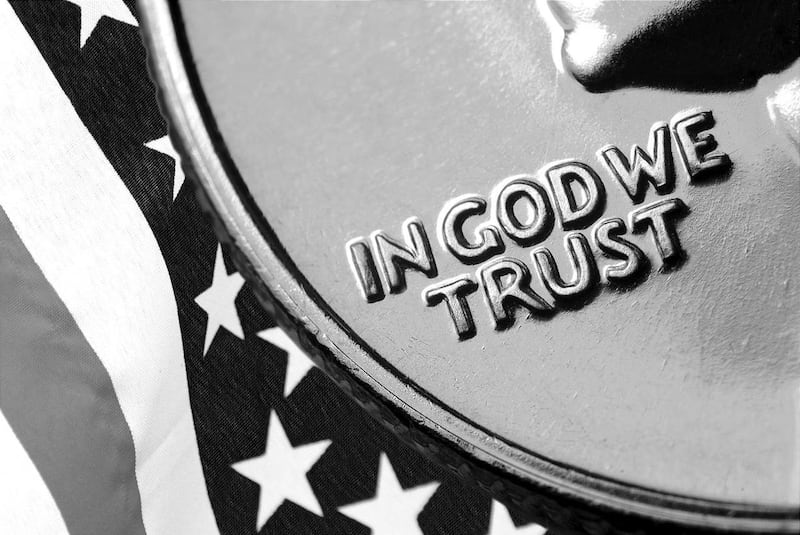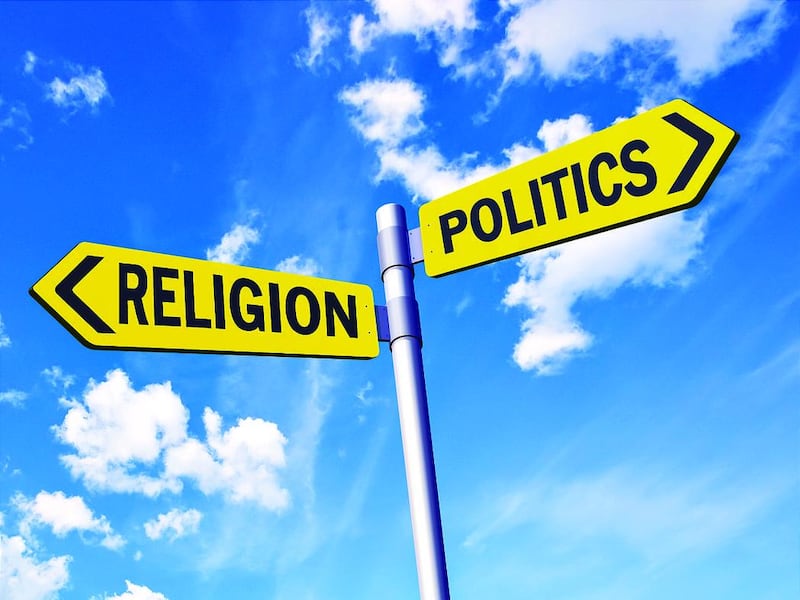While watching "All Aboard! Rosie's Family Cruise" on HBO with her conservative mother, Beverly Sharp's liberal leanings on the topic of same-sex marriage came to light. When Sharp's mom protested that a lesbian couple on the show was being able to adopt a child, Sharp came to the couple's defense.
"I see nothing wrong with them adopting him because they gave him a home where someone else didn't want him," Sharp told her mother.
Growing up in The Church of Jesus Christ of Latter-day Saints, Sharp's early political conservatism was evident in her support for Republican candidates Bob Dole and George W. Bush in the 1996-2004 presidential elections. However as she attended The University of Texas at San Antonio and fell out of consistent church activity, her views on social issues like abortion and same-sex marriage had evolved.
"Yes, abortion is wrong, but now I feel like it's a woman's right to choose," Sharp says.
According to political trends, 50 years ago Sharp's decline in religious activity would not have affected her political leanings as much as the fact that she classifies herself as Mormon. Religious affiliation has long been a significant factor in American politics, termed the "God Gap" by some, with the most recent example of the 2008 presidential election following the trend. Only 20 percent of white evangelicals (traditionally Republican) voted for Obama compared to the 94 percent of black Protestants (traditionally Democrats) who supported the current president.
However, the evolution of Sharp's political thought combined with her decline in religious activity is a new gap that has come about over the past few decades. This second "God Gap" in American politics shows those who are less observant churchgoers tend to vote more Democratic compared to those who attend frequently. Although black Protestants voted for John Kerry as a whole in 2004, only 83 percent of those who attended church weekly supported him compared to 92 percent of those who were less observant.
Political Science professor Patrick L. Fisher of Seton Hall University says this second God Gap of the past few decades comes from the emphasis of American politics on culture wars.
"It is due to the increased focus on social issues, such as abortion and gay marriage," Fisher said via email. "When the political focus was on economic issues from the Great Depression to the 1960s, church attendance was not a very good indicator of partisan leanings. To show you how much has changed, when (John F.) Kennedy (Democrat) won the presidency in 1960, those who voted for him were actually slightly more likely to be regular churchgoers than those who voted for (Richard) Nixon (Republican)."
University of Nevada Las Vegas professor Ted Jelen shares this sentiment. Having done political science research into the effect church attendance has on the views of abortion, Jelen says those who are strict observers support conservative policies despite the religious teachings.
"The more frequent attendance, the more pro-life the attitude, which has always perplexed me because not all churches are pro-life," Jelen says. "There are a number of churches where the position taken by the leadership is that while no one is for abortion, sometimes it is the best in a series of bad alternatives. But at the level of the pew it doesn't seem to matter much, frequent attendees are always more conservative on abortion than less frequent attendees."
A 2006 Gallup poll reflects Jelen's perspective. According to the poll, 39 percent of those who attend a Christian church weekly think abortion should be illegal in all circumstances, compared to just 11 percent of those who attend services once a month.
On top of the emphasis on social issues, professor John Green of The University of Akron says the assimilation of minority religious groups into the religious mainstream has also had a profound effect on the decline of the affiliation impact and the rise of the importance of attendance.
"Religious affiliation traditionally has been very closely related to ethnicity and race," Green says. "One of the things that has happened, though, is that many of the European ethnic groups who were Catholic or Protestants ... have assimilated into American society. They are not as distinctive in the way their parents or grandparents were. So what has happened is that a lot of these religious groups have lost the distinctive self-identification they had so that affiliation doesn't have the same power amongst people that it once had."
The Catholic vote is one group that has followed this trend. In 1960, Kennedy won 82 percent of the Catholic vote when attempting to become the first Catholic president, while Kerry actually lost the Catholic vote in 2004 in his quest to become the second Catholic president. Jelen says shifts like this come about because of how people reclassify their position in American society like the Catholics did.
"Most people don't really think about politics all that carefully," Jelen says. "It's usually a question of group identifications, who are we and who are we not. Most people have a fairly simple political worldview that, for lack of a better term, focuses on good guys and bad guys."
Because of this "us vs. them" mentality of American politics, minority groups like Jews and black Protestants, who don't see themselves as accepted by the mainstream, still have a diehard loyalty to the original party of their religious affiliation. In 2004, black Protestants who voted for Bush only made up 1.9 percent of his vote, while Jews who voted for Bush only made up 1.3 percent. On the other hand, 13.6 percent of Kerry's vote was made up of black Protestants, while 4 percent was made up by Jews.
Green says this loyalty was the norm before the 1960s and is still held onto by current religious minorities.
"What people actually believe, how often they went to church wasn't that important before, it was the group you belonged to whether you were active in it or not," Green says. "You can still see some of that today. For example, black Protestants are very Democratic although their beliefs are very similar to that of white evangelicals. You can also see that with smaller groups like Jews, Muslims and Latter-day Saints that still have this traditional distinctiveness that used to be very common."
According to Jelen, the Muslim vote is one bloc that is still up for grabs. With a large majority of Muslims still being relatively new to American politics, and America being one of the top 10 destination countries for Muslim migrants, Jelen suggests the predictability of their vote is up in the air.
"Muslims supported George W. Bush in the 2000 election, most likely because of the socially conservative message," Jelen says. "However after Sept. 11 all bets were off and many swung to the Democratic side."
Despite the Mormon's recent entry into mainstream media with the "I'm a Mormon" campaign, The Book of Mormon Musical on Broadway and Mormon candidate Mitt Romney being the front-runner in the Republican primaries, Mormons' political views still reflect the traditional distinctiveness Green talks about. According to a recent Pew Forum survey, three-quarters of Mormon registered voters are Republican or lean toward the Republican Party and 62 percent of Mormon Democrats rate Romney favorably.
Although Green and Fisher suggest the Mormon and Muslim vote could become more diverse as they become more accepted by the mainstream as were the Catholics, Jelen says it depends on how well they assimilate themselves through geographic movement and marriage. According to a Pew Forum survey, Mormons are naturally insulated as 83 percent of them marry within the religion, while less than half of devout Muslims believe interfaith marriage is acceptable.
"The key to assimilation is really through marriage," Jelen says. "It broadens your circle of acquaintances, you don't think of yourself as so different and people don't think of your group as so exotic."
Email: jbolding@desnews.com



